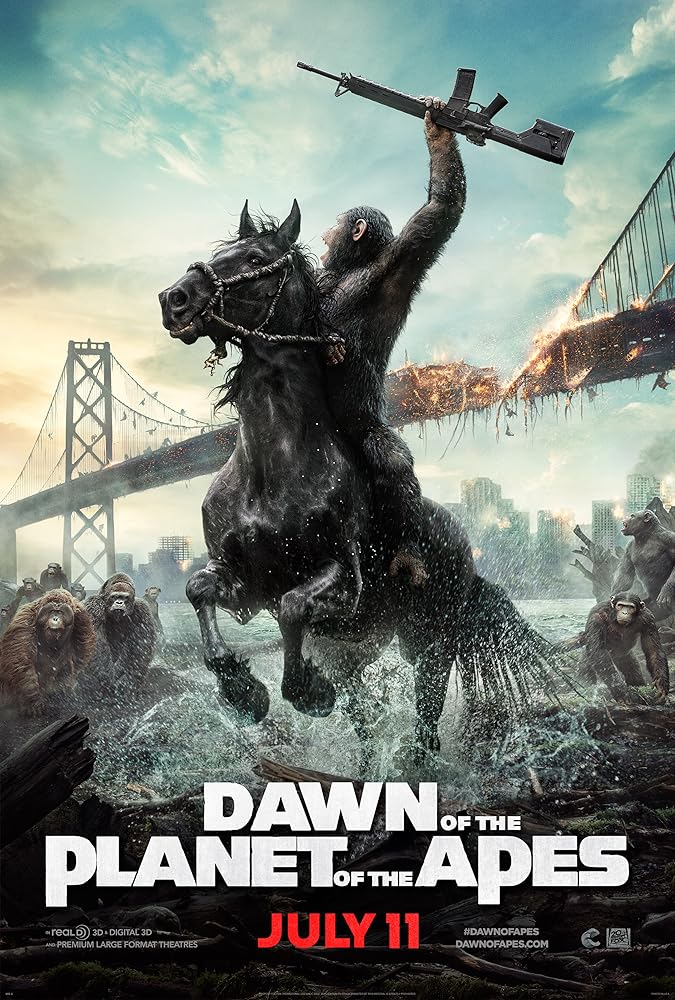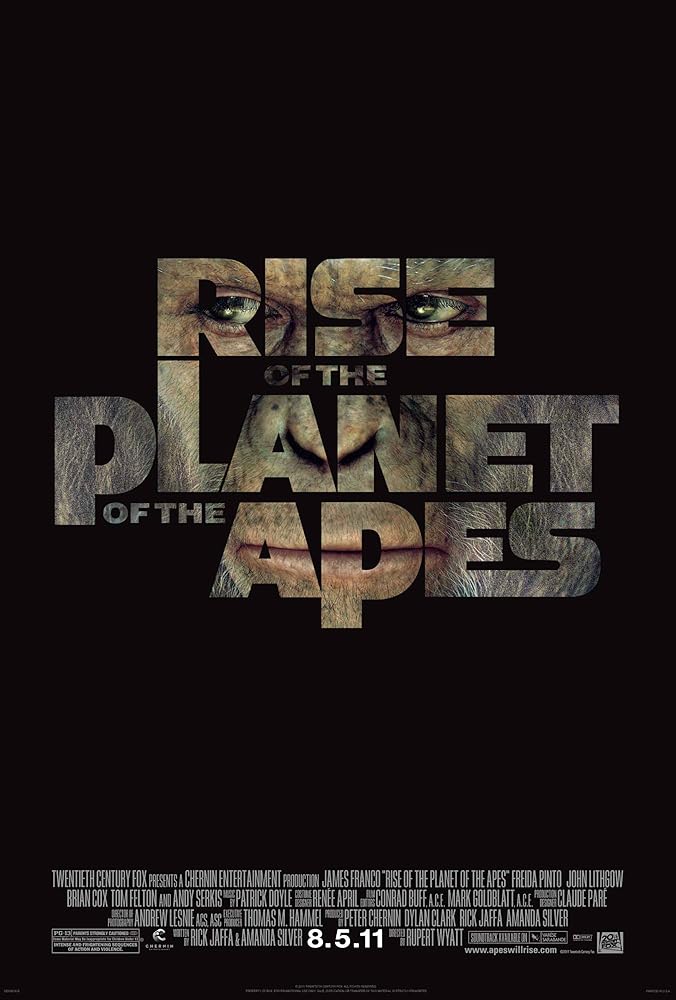
SYNOPSIS: There have been two years of fighting between the apes and the surviving US military who were called in at the end of the last movie. When the humans finally locate Caesar, the apes are forced to relocate and Caesar is thrust into battle with a personal stake in the fighting against a seemingly unstable military leader known as The Colonel (Woody Harrelson). But even as things change for the apes, an unforeseen threat has come to the humans as well.
That's all I'm going to say in the synopsis, as this movie has just been released and I would like to avoid spoilers for readers who haven't seen it yet. As you can guess from some of the imagery in the poster and some of the details in the synopsis, this new film has overtones of the Vietnam War. The recent Kong: Skull Island did as well, but War For the Planet of the Apes also draws from broader inspiration, touching on war atrocities of various kinds and being at one moment Apocalypse Now and at the next the story of Moses and the exodus. It's very smartly handled in that it never becomes one single obvious metaphor or allegory. Like its predecessor, it touches on bigger themes, but keeps them to the personal story of the narrative.
One thing I like about these movies is the way they open. Rise opened with apes in the jungle being hunted by man. Then Dawn opened with the apes in the jungle as the hunters (of deer in this case). They had become that which had hunted them in a way. Now War sees the humans and apes on somewhat equal ground as it opens with the army hunting out Caesar's base and meeting an ape ambush. The variations on this theme have been very cleverly handled across the trilogy, and that's a tribute to both the writing and the direction.
Caesar's growth as a character continues here. At the end of the last film, he had to acknowledge that apes like Koba had hatred that couldn't be overcome and they couldn't be prioritized over relations with the humans. But in this movie, Caesar is brought to face his own demons, and is he really so different from Koba after all? He's haunted by the image of Koba, a personal mental threat of what he can become if he succumbs to his own emotion. Meanwhile, the audience comes to hate The Colonel, but when we finally meet him there comes a moment where his instability comes from a seemingly rational place, if extreme. So as bad as it all seems, the actions on both sides are understandable. There is no easy solution to the conflict. War is messy.
We are introduced to new characters in this movie, both ape and human. There's an albino gorilla named Winter, who makes for a striking visual. We meet Bad Ape, played by Steve Zahn, a skittish chimpanzee who provides some of the film's lighter moments. He's not a member of Caesar's group, which makes the implication of his presence that much more important to the series at large, a glimpse of what's going on in other parts of the country and the world. There's also a human girl brought into the fold, who Maurice takes under his orangutan arm. This could easily be played for cliche, but she serves to introduce a plot point and play on the emotions of the group.
As the last film in what has become a trilogy of prequel films, War For the Planet of the Apes is a satisfying conclusion that still hints at things to come. I am on the fence as to exactly where it ranks among the three. It's similar to the second movie, but doesn't drag as that film does a little for me near the end. However, I should say I saw this movie at a trilogy screening and I was tired by the end and started nodding off here and there in the middle. I don't think that's the fault of this movie. It is certainly a strong third chapter. There is possibility of the series continuing as there is more to come until we catch up with the original film, but whether another film comes or not, this one is the closing of a chapter. If you enjoyed the second movie especially, I think you will like this one.
At this point, I'm going to get into a little bit of spoiler territory, so if you wish not to know specific details, read not further!
One element of the original Planet of the Apes that I had completely forgotten about was that the humans were mute, and far more animalistic. And so this movie begins that as part of its story. The Simian Flu virus that killed so many humans has somehow mutated, and the infected humans lose their ability to speak. The girl we meet is one of these, and she is named Nova. This is a nod to the Nova character in the original, but I'm fairly certain we can't take it to be the same character. Then again, Caesar's new son is named Cornelius, so it's possible. I'm amused that the name Nova comes from the Chevy Nova. The Colonel's whole purpose then is to stop the spread of this virus that is making his men animals. He fears for the end of human civilization. So as extreme and heartless as his actions may appear, he is not just a Colonel Kurtz figure; he's obsessed with the survival of his race. This makes him much more interesting that he at first appears, and gives the film added complexity. His compound has a cult-like atmosphere, but the germ of his motivation is understandable, even if it's too much.
Another new wrinkle introduced in the film is that there are ape defectors who now work for the humans. The humans brand them and call them "donkeys" (nods to Donkey Kong?). This makes for fascinating new dynamics of espionage and loyalty. It's no longer apes vs humans. The distinctions are not so clearly defined.
The movie ends with Caesar as a Moses figure, leading his people out of bondage and into a new home across the desert. The future is still uncertain, but there is hope for the apes that things will be better. It's an interesting way to close out Caesar's story. He began the first movie raised by humans, who ultimately become an enemy. There's even a moment where he kills another ape (something no ape had done until Koba), that reminded me of when Moses kills the Egyptian.
War For the Planet of the Apes is a smart sequel that knows its source material and what came before it. Matt Reeves has really found his niche with these films (he directed the previous one). While a lot of the movie is dark, taking place at night, I would be remiss if I didn't mention some of the beautiful cinematography. There's another nod to the original with shots of apes on horseback riding along the beach. These are gorgeously filmed, with the sky reflecting in pools of water, and it looks very good in 3D. You don't have to see the movie in 3D, but it does the 3D pretty well. The new mountain environments give this movie a distinct feel from the other two. Overall, if you liked the other movies, you should take the time to see this one in a theater. It deserves the returns for being a satisfying conclusion to a trilogy that no one could have predicted would end up as good as it did.

